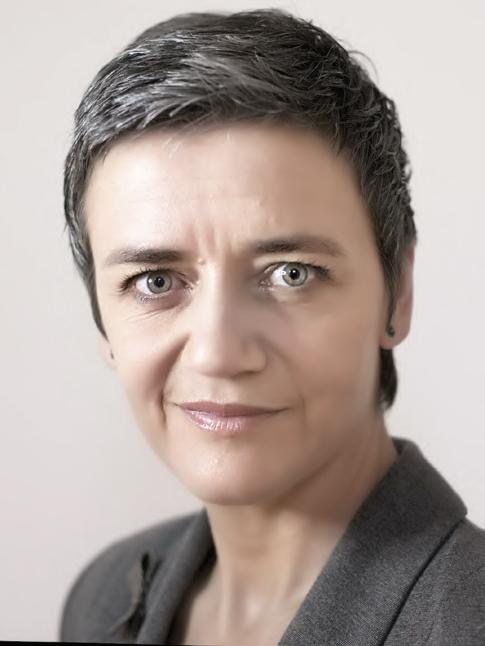
4 minute read
Technology and Politics: A Tricky Balance - Diplomat Magazine with The NYT
Social media allows for new oxygen in democracy’s bloodstream. It also allows for poison.
MARGRETHE VESTAGER
Advertisement
Danish social liberal politician, Executive Vice President of the European Commission for a Europe Fit for the Digital Age since 1 December 2019 and European Commissioner for Competition from 2014
Discussions about democracy in the digital age often begin with the assumption that democracy is under threat. Conflict is not a threat to democracy; democracy is conflict. It’s only when you have a conflict that you can actually shift your position.
But for that to work, you need to be able to manage your conflict. You need to speak a language that other people can understand. You need to be able to moderate yourself, because you want to engage as a citizen even when you have a very conflictual point of view.
In my language, Danish, we use the same word for “vote” and “voice.” That’s the point:
When you vote, you have a voice. You participate. Without that voice, there are no democratic states. And now we have new opportunities for making our voices heard.
In the days before social media, one of the most important jobs as a citizen was to vote. But most people would also have a democratic life between elections. We would sit over a cup of coffee or a beer and talk about how the government didn’t work. We would engage. And these discussions often stayed private. Between elections, politicians would lead our democratic culture. This is what has changed now. Digitization, social media, has changed it.
In the digital age, just as much as before, we feel most comfortable with people who think the same things that we do. We may forgive the odd uncle over Christmas lunch, but we don’t really want to engage in a hardcore political discussion; we want to be comfortable. The debates we have over Twitter and Facebook are different, because now they are networked. They are part of a political debate, one in which anyone can take part.
In that respect, I find that our democracy is enriched. It becomes better when more people can participate. Because otherwise, what kind of democracy do we have? Groups who were once marginalized can take part. People who felt isolated, forgotten, can take part.
Take the example of The New York Times reporters Jodi Kantor and Megan Twohey. Their articles provided the spark that launched #MeToo. But it was social media that turned the stories into a movement that made them powerful, that made them a change agent. Today, it’s not about your position, or about being invited to speak on a panel. It’s about the story you have to tell. If that story is strong, it will be influential.
Technology gives us more control over our own lives. The risk is that it gives other people a channel to control our lives as well. It’s a two-way street. The necessity is to make sure we listen to one another, and here language is indeed part of the key. What you hear more and more often these days is that women refrain from seeking public office because of the digital harassment it attracts. The openness makes it easy not only for hostile language to spread, but also for hostile ideas to spread. Social media allows for new oxygen in our bloodstream. But if poison enters our system, social media allows it to flood the entire system. That’s the challenge. Just as digitization opens up the debate, and any voice and principle can be heard, it undermines control over what we’re being presented.
We have at least two things to figure out. One relates to language: How do we express ourselves so it’s clear that we do listen to other people and that we want them to listen to us, not fear us? The other is to make sure that what we are exposed to is transparent, and that we as citizens can trust what we’re exposed to and recognize unreliable information.
We want to take control of technology so that it serves humans. And in doing that, the most important tool is democracy. This is not about social media or technology being an enemy to democracy; it’s about seeing how can we make the best use of technology to enhance democracy so we’re able to deal with challenges that we should have dealt with a long time ago.
In Copenhagen this year, at the C40 World Mayors Summit regarding climate change, former Vice President Al Gore said something I find very inspiring. “Political will is itself a renewable resource,” he said. If we can agree to use this renewable resource of political will, then we can turn social media and technology into the necessary means to enrich our democracy and solve the longstanding problems of inequality, lack of gender balance and a planet that is threatened.
© 2020 The New York Times Company and Margrethe Vestager









